Choosing the right ERP for your business can feel like navigating a maze. In the cutthroat world of ERP, each option promises to optimize growth and revolutionize your operations. So which one is the right choice?
Odoo vs Zoho are two of the top contenders in the race to streamline your business processes. Both offer a wide range of automation features, but they also differ in how they implement them for your business. This can be confusing if you don’t really understand the criteria, and you don’t know the differences between the two systems.
That’s why we’re here to break down this ERP showdown, examining the ins and outs of each platform. By the end, you’ll have a clearer picture, not of which system is best, but which one is best suited to drive your business performance and keep you ahead of the curve in an ever-changing marketplace.
Ready to find the perfect match? Let’s get started!
General: A Comprehensive Overview of Odoo vs Zoho
About Odoo
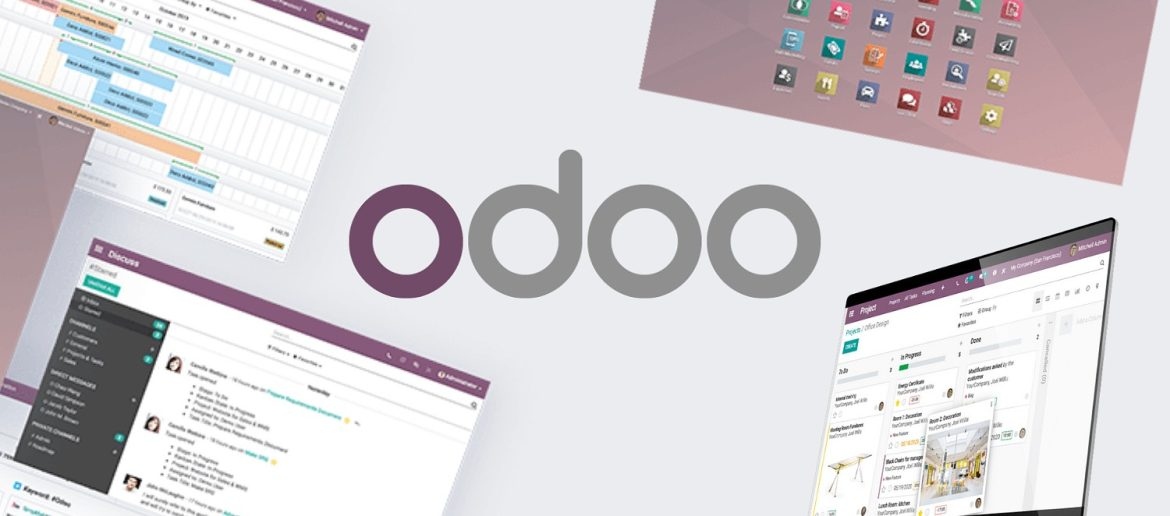
Odoo is a flexible open source ERP solution designed to meet all your business needs under one roof. Trusted by over 12 million users in over 120 countries, Odoo boasts a vast ecosystem of over 40,000 apps, targeting a wide range of industries including manufacturing, retail, and even services. With both free and paid versions, Odoo ensures there’s something for everyone. Its Community edition provides businesses with a solid foundation with essential tools, while the Enterprise Edition offers premium features for those who need more advanced capabilities.
And when it comes to hosting, Odoo also gives you a wide range of options - on-premise, cloud, or even SaaS. This flexibility, combined with the support of over 2,500 global partners, makes Odoo the ideal platform for your business to control, grow, and scale resources efficiently.
Pros | Cons |
|
|
About Zoho
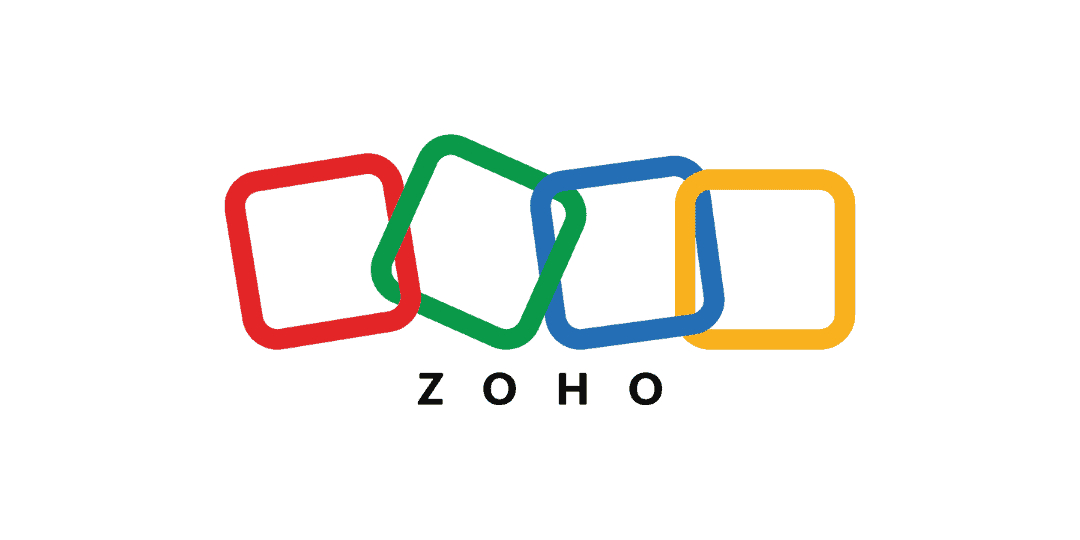
Zoho, on the other hand, is a simpler business suite, designed as an all-in-one solution to make managing your business operations easier.
Zoho positions itself in the minds of its customers with two key keywords: “ease of use” and “affordability”. Starting out as a CRM tool, it has quickly evolved into a comprehensive platform with over 40 integrated applications covering everything from sales to customer support.
Unlike Odoo, Zoho is completely cloud-based. This means you can manage your business operations from anywhere without complicated setups or maintenance.
Zoho excels at keeping things straightforward, perfect for businesses that want to hit the ground running without needing much customization.
Pros | Cons |
|
|
Odoo vs Zoho: A Quick Comparison Table at a Glance
Feature | Odoo | Zoho | Verdict |
Pricing | Competitive | Budget-friendly | Odoo |
Customization and Scalability | Highly customizable with extensive integration capabilities | Limited customization options with some pre-built connectors | Odoo |
Business Development Support | Comprehensive support with extensive resources, training, and dedicated consultants | Basic support, primarily focused on online resources and community forums | Odoo |
Customer Support | Robust options including community forums, paid enterprise support, and extensive documentation | Multichannel support through email, phone, and live chat, providing quick responses | Zoho |
User Interface | Modern, intuitive design that promotes ease of use | User-friendly interface designed for straightforward navigation | Odoo |
Security | Advanced security measures including role-based access control, data encryption, and secure connections | Standard security features such as two-factor authentication and basic data encryption | Odoo |
Integration | Extensive integration options with third-party tools and seamless module connectivity for advanced workflow automation | Integration primarily with Zoho apps and limited third-party tools through connectors | Odoo |
You should also read this article: Detailed Comparison Between Odoo Accounting vs Quickbooks: Which is Better?
In-Depth Feature-by-Feature Comparison: Odoo vs Zoho
Which One Offers Better Pricing?
Odoo
Odoo’s pricing model offers flexibility that’s hard to beat.
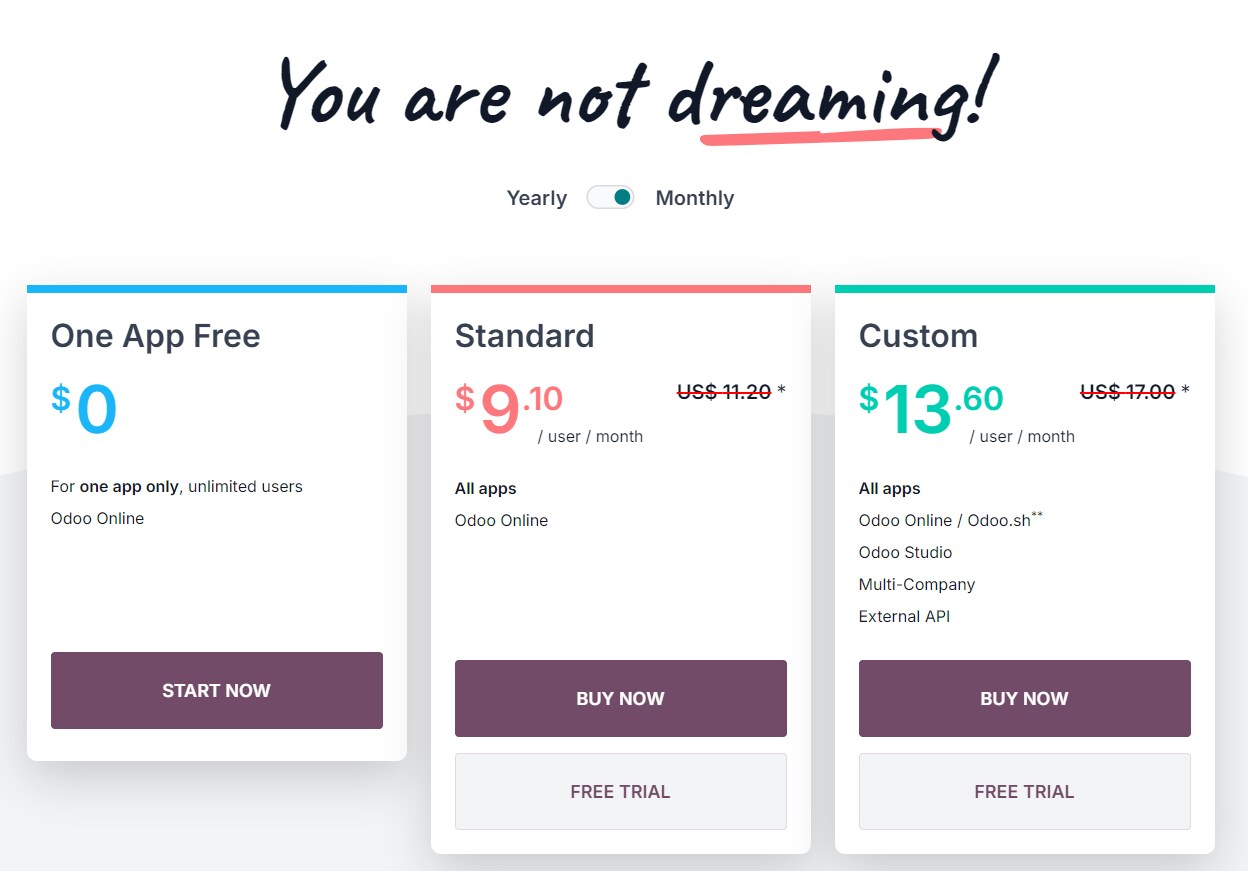
- It starts with one app completely free for unlimited users, which is great for small businesses or startups testing the waters.
- With the paid version - Standard: Odoo pricing starts at $9.10/month per user, giving access to all apps in just one subscription.
- With the Custom plan for businesses running multiple branches at once: Odoo pricing starts at $13.60/month per user, allowing you to scale easily.
Odoo’s flexible pricing structure ensures that business owners like you only pay for what you really need, from a simple CRM to a full-blown ERP system.
Zoho
Zoho is incredibly affordable, which is what makes it such a popular platform. However, Zoho limits the free version to 3 users and basic functionality. After that, you’ll need to pay for specific pricing packages.
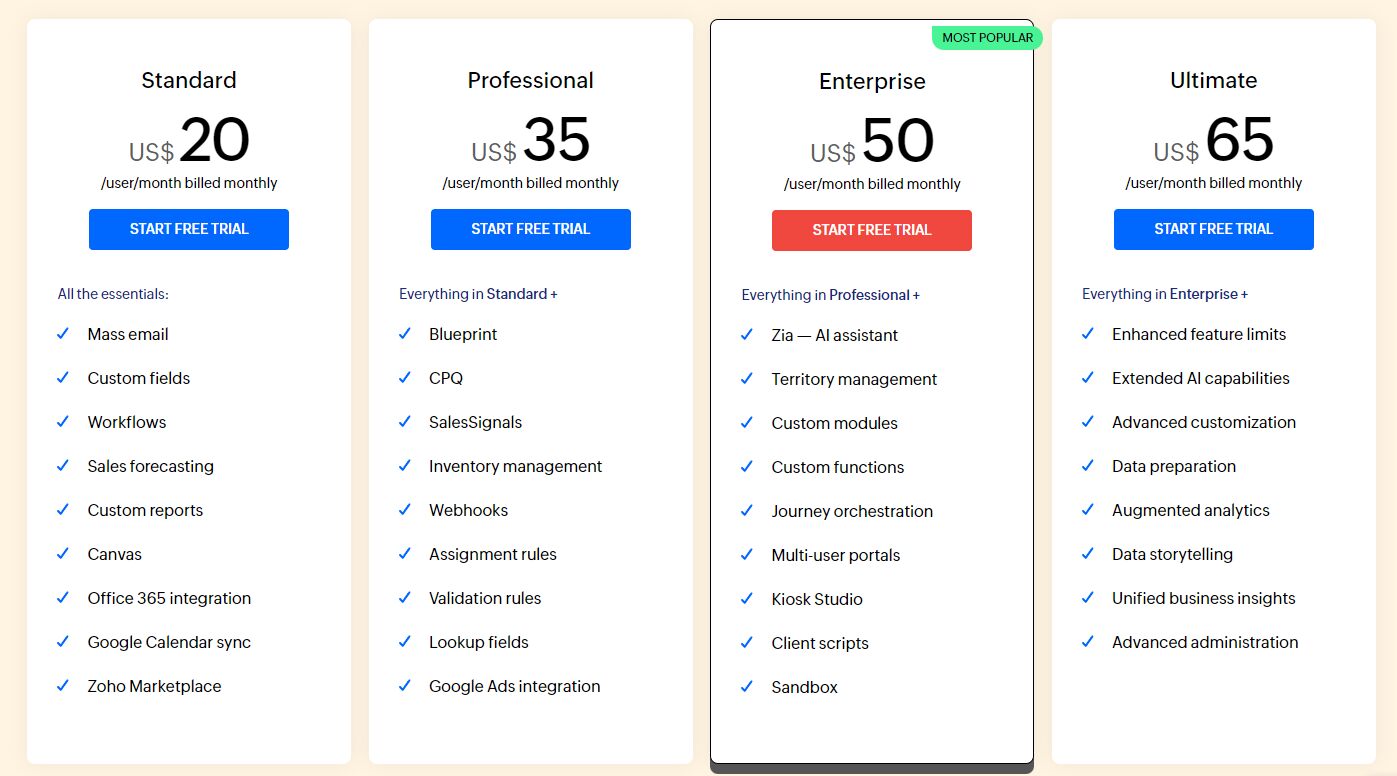
- Standard: If you want to grow beyond the functionality in the free version, you’ll need to choose from the available pricing packages, starting at $20/user/month
- Professional: $35/user/month
- Enterprise: $50/user/month
- Ultimate: As demand increases, so does the price. This package costs $65/user/month, with full CRM functionality.
While the prices are relatively competitive, scaling with Zoho can quickly become expensive, especially if you’re aiming for advanced automation and customization.
Verdict
Odoo wins in this pricing battle between Odoo vs Zoho. With its free unlimited-user plan and comprehensive suite of apps in its paid Enterprise edition, it offers significantly more flexibility and affordability. This is especially important for growing businesses looking to optimize operational costs and resources.
Which Handles Customization and Growth Better?
Odoo
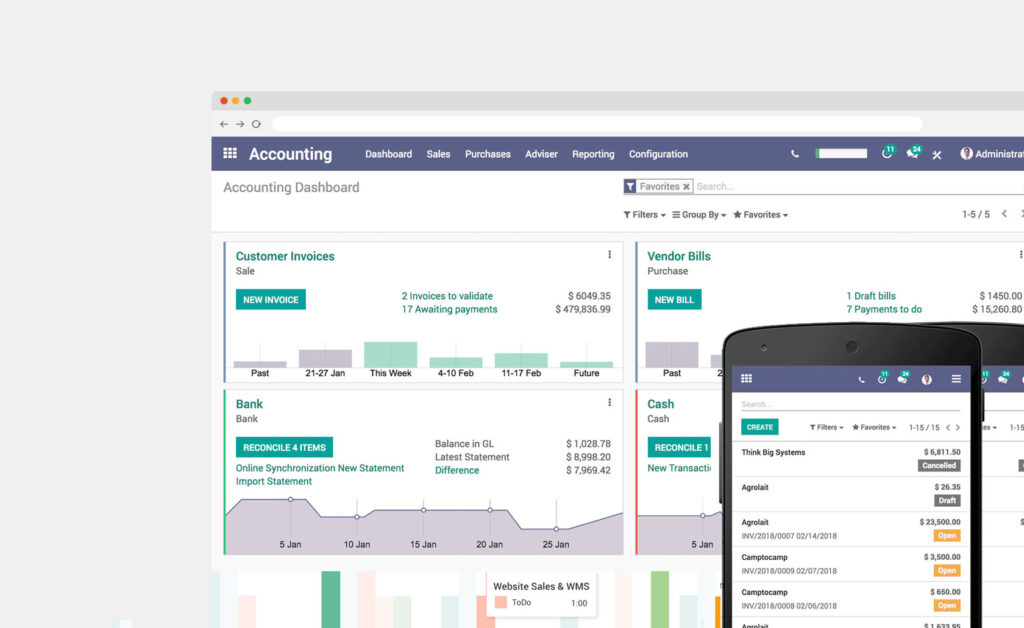
When it comes to Odoo customization, Odoo is like clay - moldable to fit your exact needs. Odoo is built to be customized, with an open source architecture that allows you to customize your workflows, reports, and processes. Whether you are scaling or pivoting, Odoo can scale with ease.
Plus, with the Enterprise plan, you get access to all the apps bundled in just one package, covering everything from CRM to inventory to HR - without the need to purchase extra modules. Odoo grows with you, providing seamless scalability and keeping everything running smoothly without any hidden costs.
Zoho
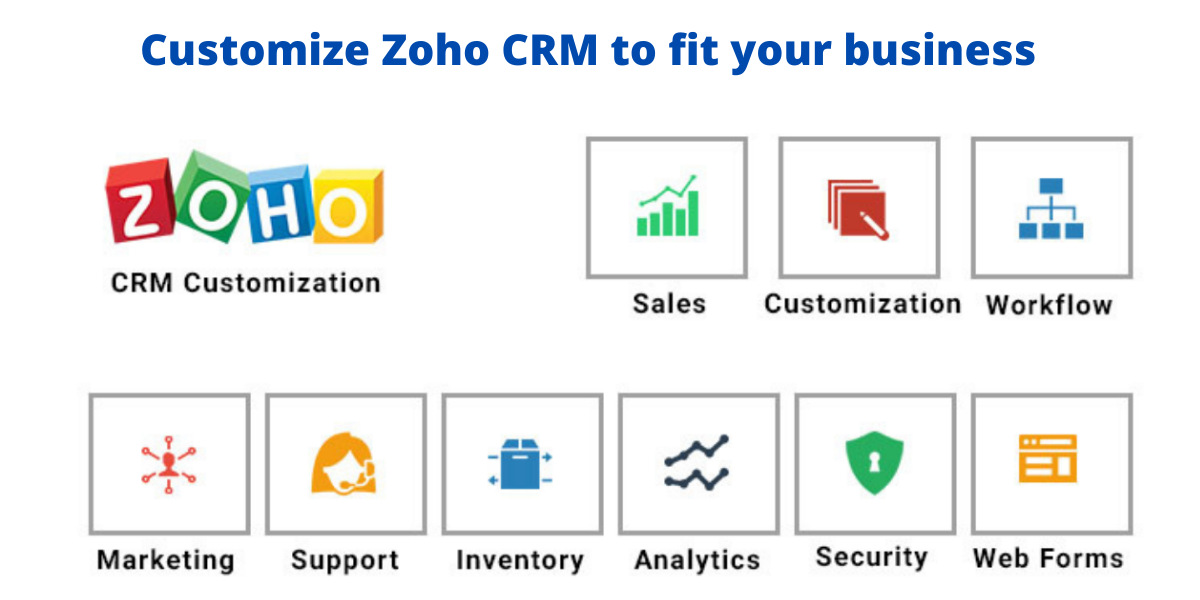
Zoho offers a wide range of customizations, but here’s the catch – you’ll need to purchase separate products to meet your complex needs.
Want ERP functionalities? Please kindly add Zoho Books. Need project management? Zoho Projects is a separate purchase.
This piecemeal approach may seem flexible at first, but in practice, our team of experts found it to be a major risk in limiting scalability in a few cases. This can be a disappointment if you’re looking for a comprehensive system that can easily grow without constant add-ons. It’s more of a patchwork than a unified solution.
Verdict
Odoo is the clear winner here, when comparing Odoo vs Zoho. Its all-in-one platform and deep customizability make it perfect for businesses that need scalability without the hassle. You have everything in one place - easy to find, easy to see, fast - rather than struggling with multiple tools in unfamiliar locations.
Which Supercharges Your Business Growth with Sales, Marketing, and Reporting Tools?
Odoo
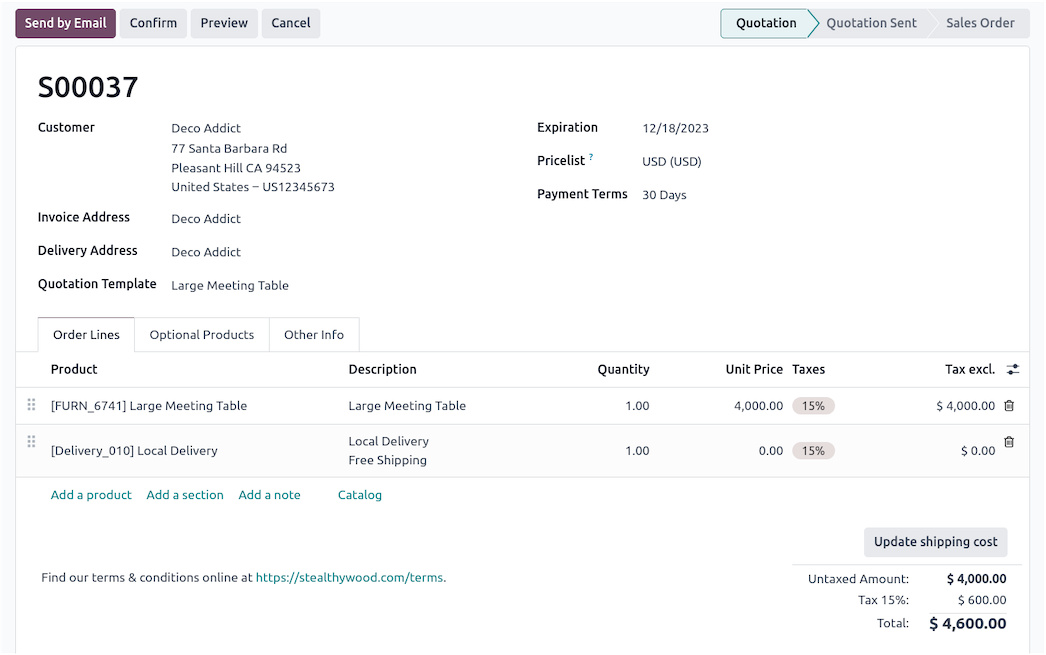
Odoo is an all-in-one business machine, with all the listed functions like Sales, Reports, and Marketing. From sales and marketing to detailed reporting, Odoo can handle it all. You can also do all the other tasks listed below on just one platform - which is like a real miracle for businesses:
- Create quotation templates
- Manage registrations
- Track leads
- Run events
- Create e-signatures, take online payments, and integrate shipping
Odoo's signature flexibility helps businesses streamline their operations and focus on scaling without having to switch between different tools.
Zoho
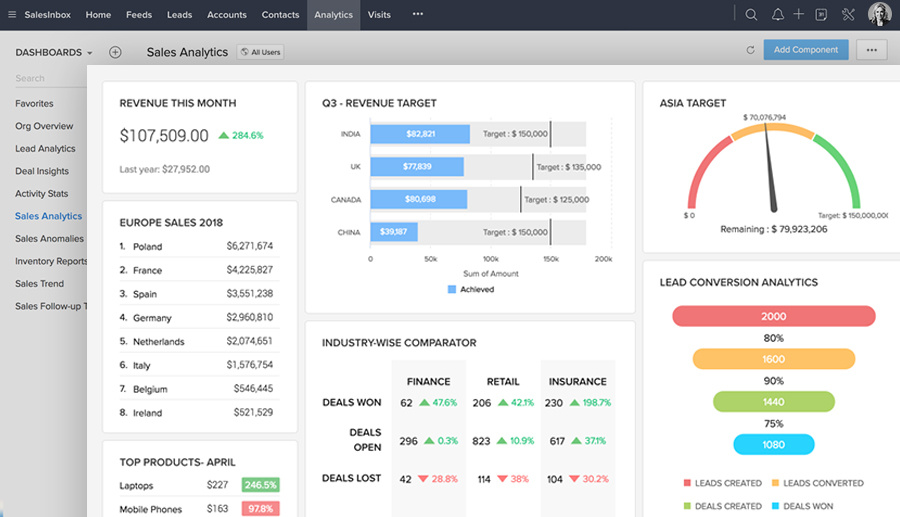
Zoho offers solid tools to work with, especially in marketing and reporting areas like mass mailing, online lead capture, and broadcast surveys.
But when you break it down feature by feature, it falls short in some areas that are important to growing businesses.
Zoho still lacks a few key features:
- Price list creation
- Shipping method integration
- Subscription management
These shortcomings can be frustrating for businesses looking to streamline their customer relationship management processes. While Zoho impresses with its user-friendliness, its reliance on add-on apps when users need more advanced features means businesses may feel boxed in when trying to scale.
Verdict
Odoo wins this round of comparison between Odoo vs Zoho with ease. Its all-in-all feature set, which covers everything from lead tracking to subscription management, gives businesses a comprehensive and unified solution to streamline the sales process. Zoho simply doesn’t fit all the desired level of business growth support.
Which Offers The Best Customer Support Experience?
Odoo
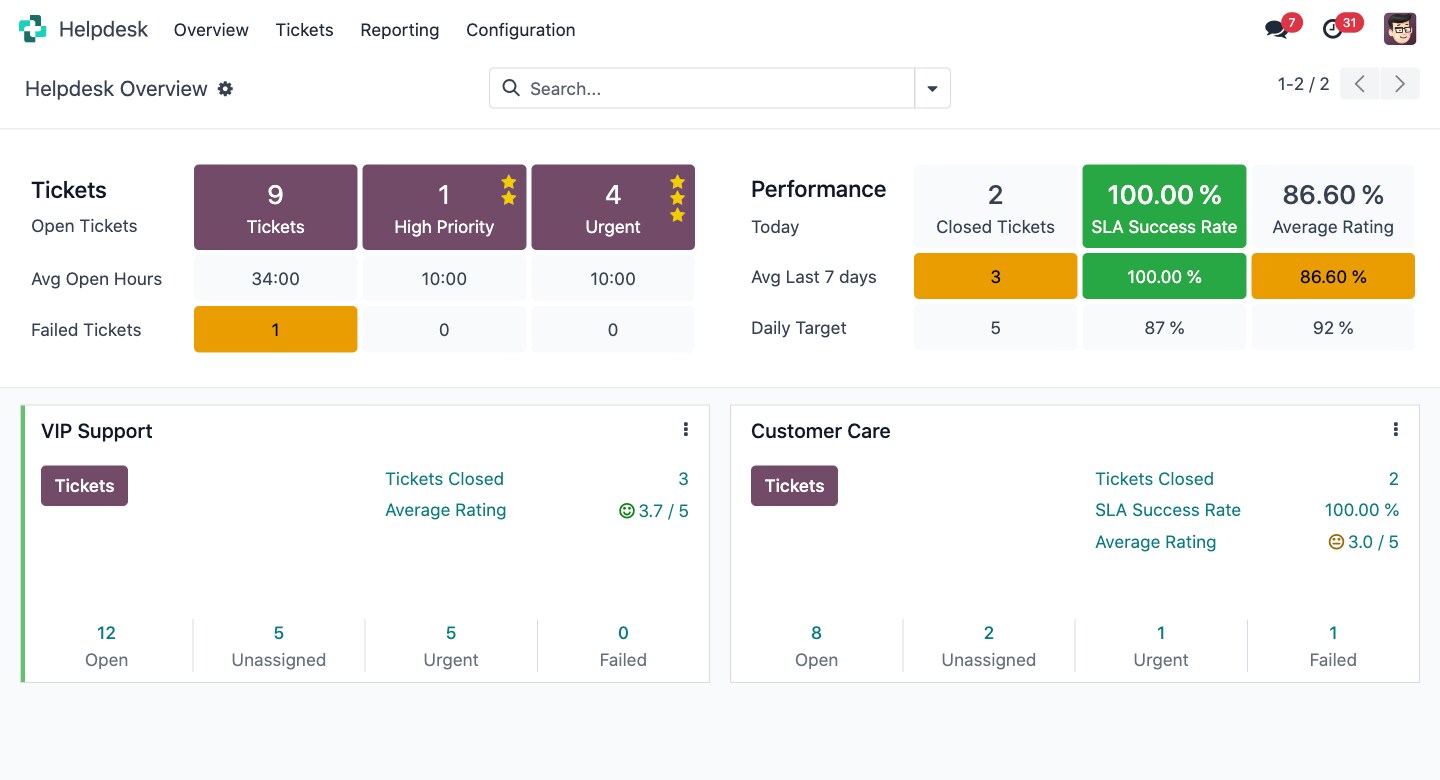
Odoo has successfully built a solid reputation not only for its extensive and comprehensive application repository, but also for its diverse support options, both for self-service and enterprise users. What exactly do they provide in terms of timely and efficient support solutions?
- Extensive Documentation: Odoo provides detailed user manuals and guides to help users solve problems on their own. This is a perfect choice when you want to solve problems yourself in the fastest time, right at the moment of discovering a loophole in the operating system.
- Active Community: Another important feature is Odoo’s community driven support. You are welcome to visit Odoo users forums, ask questions, and benefit from the shared knowledge of other Odoo users and experts. Although not formalized, the community can provide valuable insights and solutions.
- Enterprise-Level Paid Support: For businesses looking for priority support, Odoo’s paid enterprise support offers a direct line to expert help. This option is ideal when your business needs custom technical support or to quickly get critical issues on track. However, this level of help will usually come at an additional cost.
Zoho
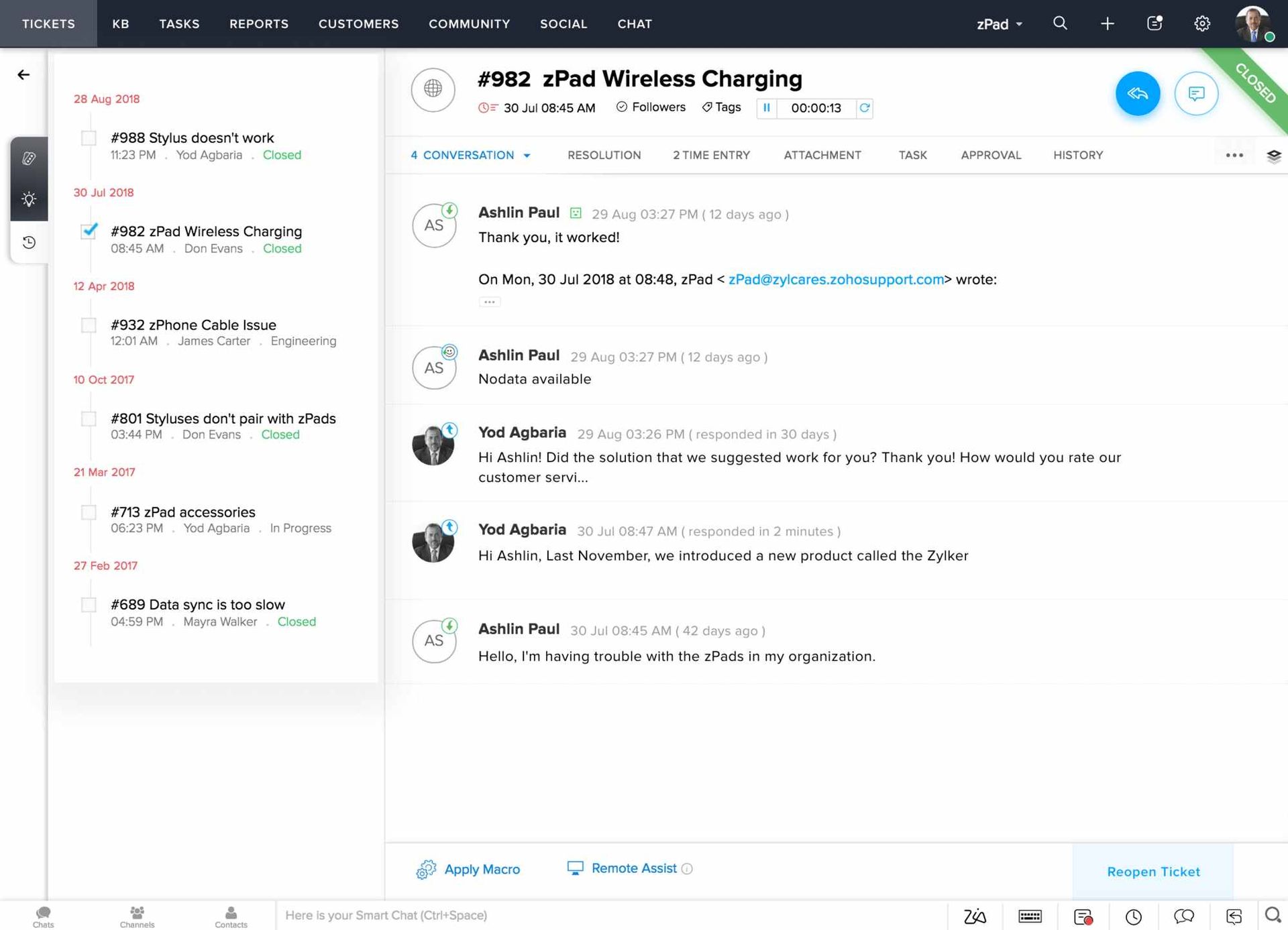
Zoho takes a more interactive and immediate approach to customer support. It might have an edge for businesses that need instant human assistance.
- Direct Human Assistance: With email and phone support, Zoho ensures that you can talk to a real person when facing an issue. Whether it is a simple query or a complex problem, this approach is sure to help you get personalized solutions and easy fixes. This is especially important for technical issues.
- Real-Time Help: Zoho offers live chat with a support agent, which is a great option in case your business is facing urgent issues that cannot wait. The speed and responsiveness can make a big difference, especially when something goes wrong.
- Knowledge Hub: If you prefer self-service like with Odoo, Zoho also offers a support center packed with tutorials and articles. This knowledge center can be a useful tool for resolving more common issues without waiting for a response.
Verdict
When it comes to customer support between Odoo vs Zoho, Zoho wins hands down. The combination of live chat, email, and phone support gives users the option to get instant, personalized help. At the same time, the quick human interaction and multiple communication channels make it a more efficient and accessible option.
Which Offers a More Intuitive User Interface?
Odoo
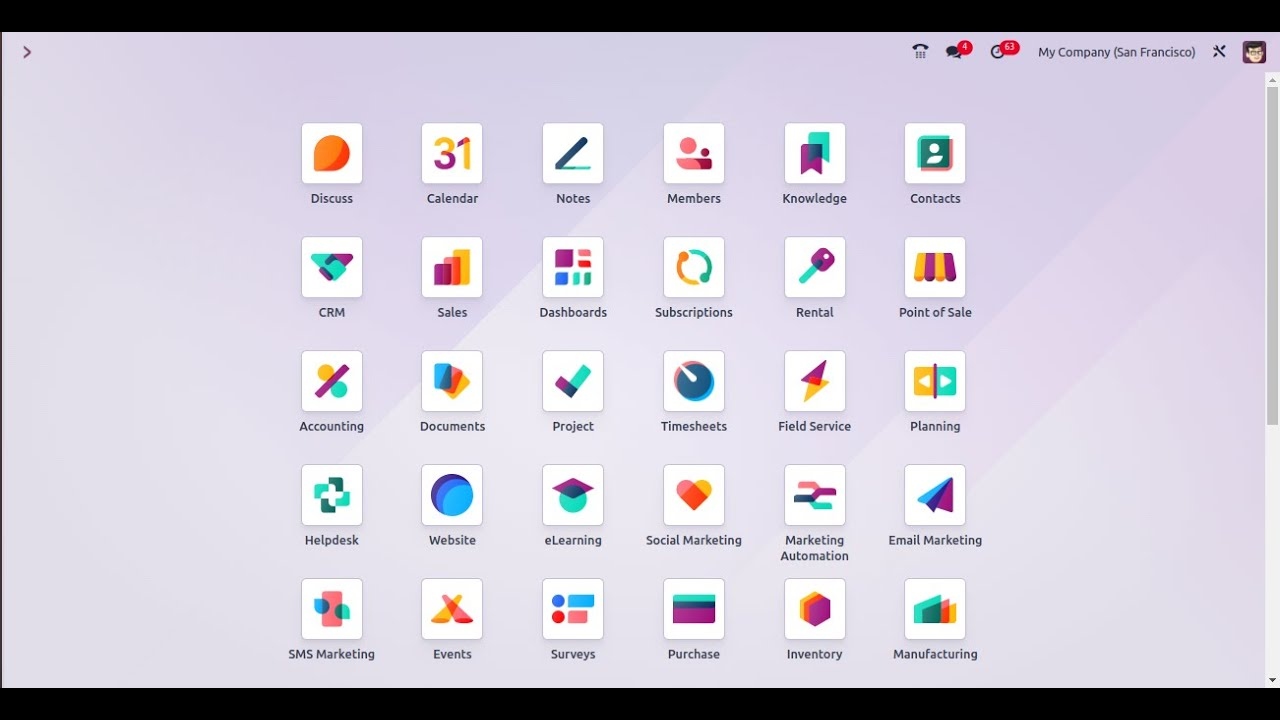
Odoo has invested heavily in creating a modern, clean, and visually appealing user interface. Navigation has also become much easier and improved with each version.
Some special points about Odoo’s user interface when comparing Odoo vs Zoho:
- Fast Learning Curve: With its intuitive design, users can quickly get acquainted with Odoo’s interface as soon as they start using the system. It offers a simple yet effective layout, making it easy to find the desired features. This is especially useful if you are concerned about the impact on productivity when your staff transitions to a new system like Odoo.
- Customizable Dashboards: Odoo also allows users to customize their dashboards so they can display the most relevant information based on their role. This personalized approach improves the overall experience by focusing on what’s important for each team member.
Zoho
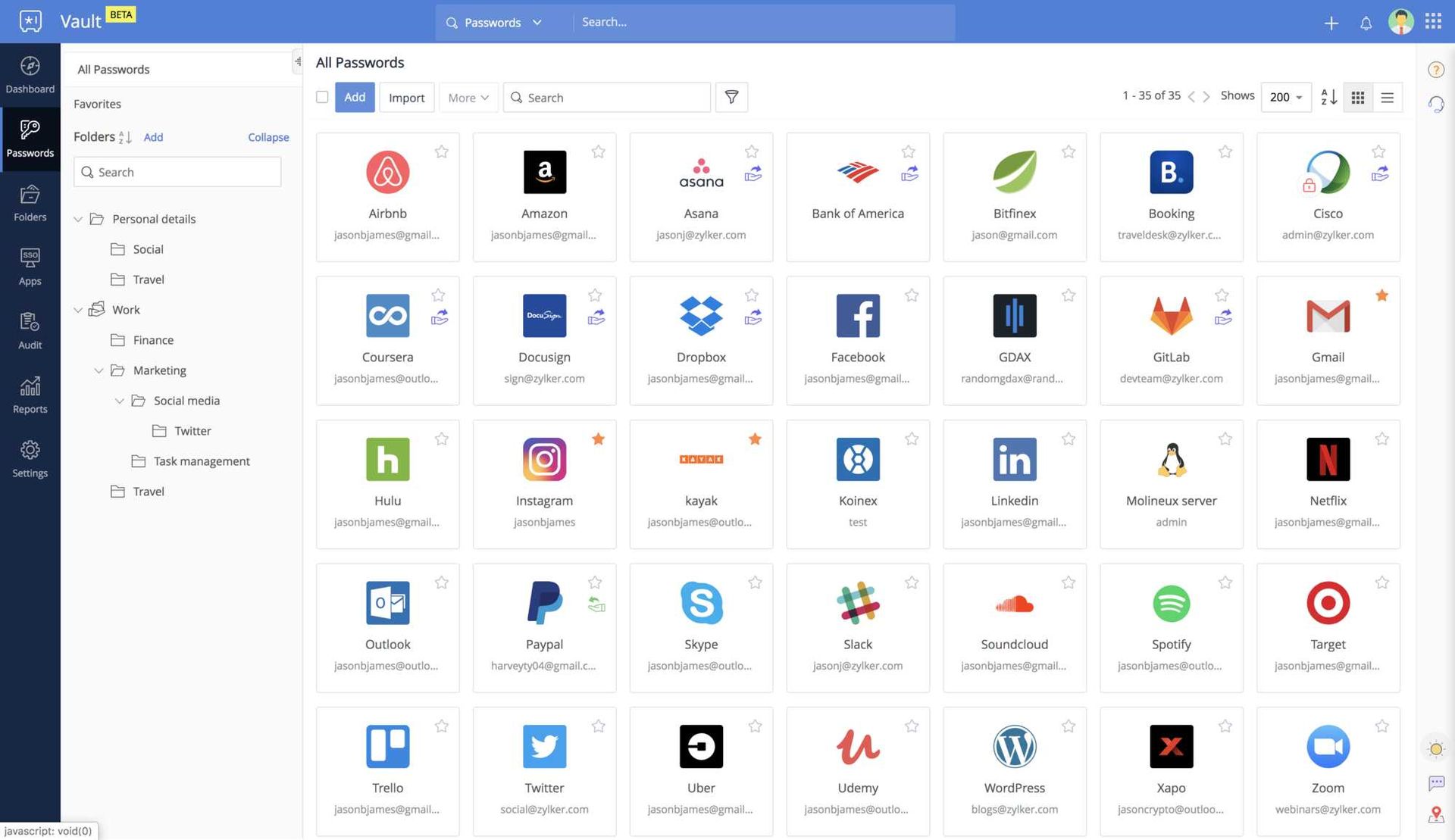
Zoho is known for its easy-to-use and user-friendly interface, ideal for businesses looking for ease of use.
- Beginner-Friendly: With Zoho, users can easily navigate through the system without much prior experience with the platform. The interface is designed to be simple, allowing users to access tools and features with minimal effort. Training time for staff is also saved to the maximum.
- Logical Layout: Zoho's interface has a clear, logical structure, making it easy for users to understand where everything is. If you are a person who follows the school of simplicity, focusing on functionality rather than an overly flashy and beautiful appearance, then this is one of the choices that deserves to be on the top list.
Verdict
Odoo vs Zoho both offer a user-friendly interface, but Odoo emerges as the winner in this comparison. Odoo’s modern, customizable dashboard and intuitive design offer a more refined and flexible experience, capable of catering to both basic users and advanced team members. Zoho, according to many users, has not really excelled in balancing aesthetics and functionality, getting tasks done efficiently.
How Does Each Platform Protect Your Business Data?
Odoo
Odoo uses an open-source foundation, which offers great flexibility by allowing businesses to customize the system to their specific needs. However, this flexibility comes with a challenge of ensuring strong security. Fortunately, Odoo has successfully addressed this issue.
- Role-Based Access Control: Odoo allows businesses to implement role-based access, ensuring that only employees directly authorized by you can access sensitive information. This is especially true in environments with multiple departments handling confidential data.
- Data Encryption and Secure Connections: Odoo secures workflows by providing secure data encryption and communication protocols. Whether you need to process financial transactions or set up a detailed system of personal customer information, Odoo ensures your data is safe at every step.
- Regular Security Updates: Odoo regularly releases security patches and updates to address vulnerabilities. Keeping these patches up to date is essential to maintaining a secure environment, especially in a customizable platform where new integrations can introduce risks.
Zoho
Zoho focuses on providing out-of-the-box security with limited customization, making it easier for businesses to manage without having to overhaul their security.
Some of Zoho's security highlights:
- Two-Factor Authentication: Zoho emphasizes protecting users with features like two-factor authentication, ensuring that access to sensitive data is limited to verified users.
- Data Encryption and Compliance: Zoho also offers data encryption for both data at rest and data in transit. It also complies with industry-standard regulations, which may appeal to businesses in regulated industries.
- Limited Customization: Zoho focuses on providing a suite of integrated applications with fairly limited customization options. This can simplify security management because there are fewer customizable components, which in turn limits vulnerabilities. However, this can also prevent businesses from finding bespoke, personalized functionality that suits their unique needs.
Verdict
Both Odoo vs Zoho ensure essential security features, but Odoo is sure to be the winner in this round. This platform possesses powerful and flexible customization capabilities, combined with advanced security measures, promising a comprehensive and personalized secure environment to protect sensitive business information.
How Well Can They Connect with Your Existing Tools?
Odoo
Odoo stands out as a powerful ERP platform, designed to seamlessly integrate multiple business functions. The open-source nature of the platform allows for robust API integration, making it easy for users to automate workflows and connect with multiple third-party tools.
Odoo’s cross-functional collaboration is reflected in the following key features:
- Unified Platform: Provides a comprehensive ERP solution with multiple pre-integrated modules.
- API Integration: Extensive API options enable advanced workflow automation and connectivity with third-party applications.
- Cross-Functional Integration: Supports simultaneous use of multiple systems, facilitating coordination between departments.
- Customizability: Highly customizable with the help of Odoo’s ERP consultants.
Zoho
Zoho is designed with a focus on customer relationship management by streamlining CRM functions. It also includes many pre-built connectors, allowing businesses to connect with external systems. However, its integrations may not be as comprehensive as Odoo’s, especially since it is almost entirely focused on CRM.
Some differences in Zoho’s integration capabilities:
- Ecosystem Integration: Strong connectivity in its suite of applications, especially for CRM functions.
- Pre-Built Connectors: Offers pre-built connectors and custom applications to integrate with external systems.
- CRM-Centric Design: Focuses primarily on enhancing CRM functions, which may limit integration with specialized tools.
Verdict
When comparing Odoo vs Zoho integration capabilities, most users agree that Odoo is the better platform. It is great for businesses looking to streamline operations and increase productivity, with its open source nature making it easy to connect and integrate with APIs.
Odoo vs Zoho: Which ERP is the Perfect Fit for Your Business?
Choosing the right ERP system is very important to optimize the business operations of enterprises. Both Odoo vs Zoho have their own strengths and cater to different needs. It is important to see which option will be the most optimal and suitable for your business at present and with future directions.
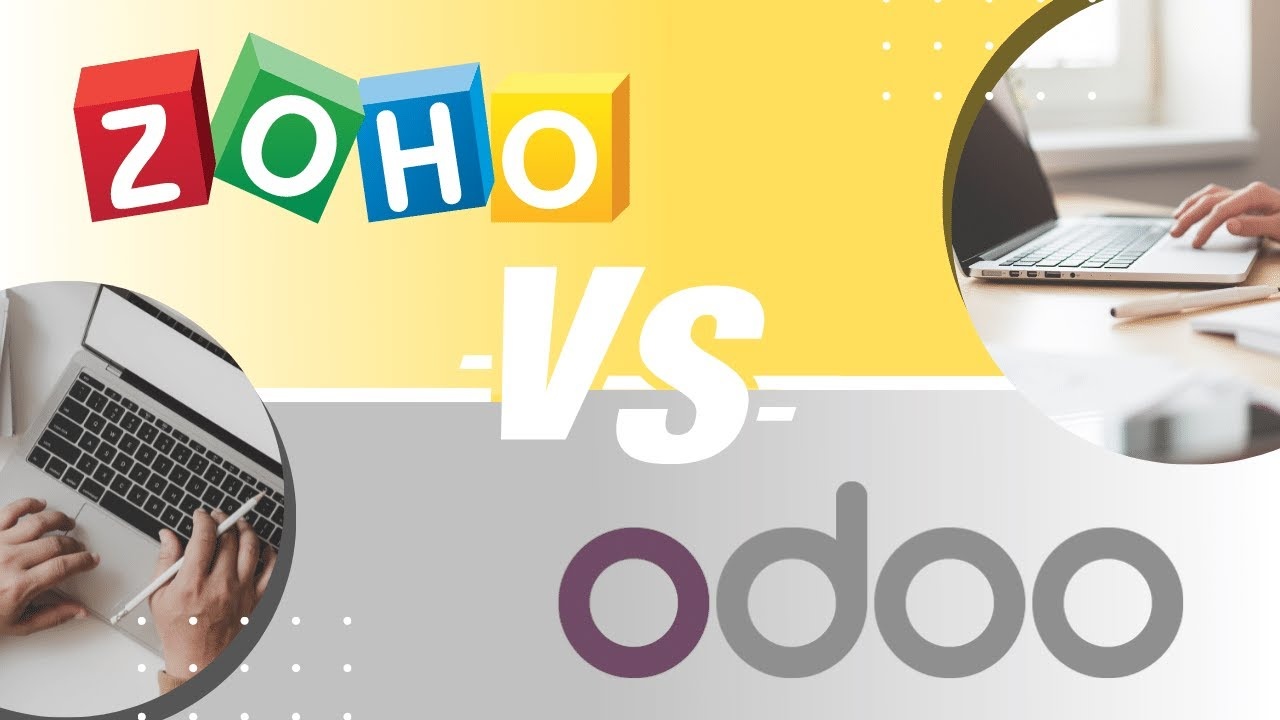
Odoo is ideal if you are …
- Looking for comprehensive business management: Odoo offers a wide range of integrated applications to efficiently manage every aspect of your business.
- Looking for customization and flexibility: Its high level of customization allows you to tailor the software to meet your specific processes and workflows.
- Focusing on automation and efficiency: Odoo excels in automating workflows, helping to streamline repetitive tasks and improve productivity.
- Planning for scalability: Odoo's modular structure allows you to start small and expand functionality as your business grows.
- Prioritizing comprehensive support options: Odoo offers a robust community and paid support, offering different levels of support as required.
Zoho is ideal if you are …
- Primarily focused on CRM capabilities: Zoho stands out for its expertise in customer relationship management, making it ideal for businesses that focus on customer engagement.
- Seeking a user-friendly experience: The intuitive interface allows you to quickly adopt operational processes with minimal training requirements for your team.
- Budget-conscious with resource management: Zoho offers a competitive pricing model, making it a cost-effective solution for small businesses and startups.
Final Thoughts
Odoo vs Zoho are two potential names in the ERP world. However, not both of them are the optimal choice for your business, and knowing their strengths and weaknesses will help you make the right decision. Investing to generate more revenue is what every business owner wants, and having an ideal Odoo ERP or Zoho system is one of the first steps to achieving this goal.
Don't hesitate to contact us if you want any custom consultation about which ERP platform, Odoo vs Zoho, that you should use for your business!
